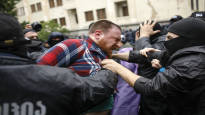Georgia, located in the Caucasus, Russia’s southern neighbor, is bubbling.
Over the weekend, large crowds marched through the streets of the capital Tbilisi wrapped in EU and Georgian flags.
Tens of thousands of people have participated in the protests.
The tension escalated on the night before Monday in front of the parliament building, where the gathered protesters tried to prevent the progress of the legal initiative.
They didn’t succeed – it only took about a minute for lawmakers to give the green light for the bill to move forward, and parliament is scheduled to vote on the issue for the final time on Tuesday.
Editor of Antti Kuronen told protesters in front of the parliament building on Monday morning in Tbilisi.
– Georgia was the first country that Russia openly attacked in 2008, said Dato Sikharulidze.
According to him, Russia has continued the hybrid war against Georgia after the war.
Student Lia Khutsishvili does not want to have anything to do with Russia.
– We are protesting the law that is destroying our country.
The situation in Tbilisi continues to be tense, says Kuronen.
– The police have used very strong tactics, such as water cannons and tear gas. Many Georgian opposition activists have been ill-treated.
In Georgia, according to opinion polls, about 80 percent support the EU and the West, says Kuronen.
The demonstrations are to continue.
This is what the bill is about
The former Soviet republic has been tested by huge protests for weeks.
Demonstrators are opposing the proposed law dubbed Russian law. A similar law has been used in Russia to crush civil society and silence critical voices.
According to the demonstrators, the government is now sympathizing with Russia, which wants to block Georgia’s EU membership in every way.
The bill proposes that if a media or non-governmental organization receives more than a fifth of its funding from abroad, it must register and disclose its source of funding. Violations would result in huge fines.
Protesters also fear that the law could be used to suppress critical voices. Georgia will hold parliamentary elections later this year.
According to supporters of the bill, the law would increase the transparency of the funding of non-governmental organizations.
It is not the first time that the current administration of Georgia has made such a statement. A year ago, the administration abandoned the legislative initiative after large-scale protests.
Will it go to Georgia rather than Ukraine?
Georgia has just under four million inhabitants. It lacks strong protection against Russia like EU and NATO membership. Georgia got the status of an EU candidate country one and a half years ago.
The plight of the former Soviet republic is reminiscent of the events in Ukraine ten years ago. In Ukraine, the then president Viktor Yanukovych sabotage the EU process. People took to the streets and eventually drove the unpopular president into exile in Russia.
Russia reacted to the pro-Western revolution by illegally occupying Crimea and Russia invading Eastern Ukraine.
There are also differences, says the professor of Russian politics Vladimir Gelman from the Alexander Institute of the University of Helsinki.
In Georgia, the current administration is quite popular, according to Gelman, and more than 30 percent support it, while the opposition’s support numbers remain in the single digits.
The ruling party Georgian Dream can very well win the autumn parliamentary elections, he estimates.
The party is an oligarch who has gotten rich in Russia Bidzina Ivanishvili creation. He is the richest person in Georgia.
According to the protesters, Ivanishvili is still promoting Russia’s cause in Georgia.
On the map below you can see the areas under Russian control.
Tanks only 50 kilometers away
Russian troops are 50 kilometers away from the capital in the occupied territories. Gelman does not believe that Russia is threatening to attack right now.
– Tanks could approach Tbilisi at any moment, it is technically possible, but I don’t think this is an immediate threat to Georgia.
Gelman believes that many still remember the 2008 war well and are afraid. At that time, Russian tanks rumbled in hostilities in a neighboring country for the first time since the collapse of the Soviet Union.
The war was swift and devastating.
Researcher: The situation in Georgia is the same as in post-war Finland and the Soviet Union
The 2008 war was a significant turning point in the relations between Georgia and Russia.
The researcher compares the current situation to what Finland and the Soviet Union had after the Second World War.
– In Georgia, the current administration avoids all actions that contradict Russia’s will, says Gelman.
But how did the countries go from the brink of war to becoming partners?
There are many reasons for this.
Russia is Georgia’s most important trade partner, Gelman reminds.
According to him, the background of the current administration’s support is the economy, which has grown under the former president Mikhail Saakashvili after giving way to power.
– After the stormy years, the situation today is much more stable and calm, says Gelman.
In addition to business life, there are numerous informal connections between the two countries.
What does the law mean for Russia?
According to the researcher, the law shows that the current administration wants not only to stay in power but also to follow Russia’s example in some matters. According to Gelman, this is important in the Kremlin’s foreign policy.
– In fact, Georgia is considered a battleground between Russia and Western influence.
And definitely Russia would like to keep Georgia on its side.
Young, wealthy and educated people are very pro-EU, says Gelman.
Editor of Antti Kurra summarizes what the bill is about in the video below.
Sources: Reuters, AFP, AP, STT
